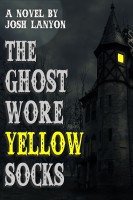The Brief History of the Dead - Brockmeier Kevin (книги бесплатно без регистрации TXT) 📗
She could never have guessed that she would live there someday – and not just at the bottom of the world, but at the bottom of the bottom of the world. Could never have guessed that she would almost certainly die there. But then, she could never have guessed so many things. That she would fall out of love with the man she dated in college and never speak to him again. Or that a degree in environmental biology would send her to work for the Coca-Cola Corporation. Or that her father would live through two separate heart attacks and a minor stroke without dying.
"You and your mother," she heard him saying. "It could be ninety-eight degrees outside, and as soon as the air conditioner comes on, you both complain that you're freezing."
Bump.
SEVENTY-EIGHTH ENTRY, MARCH 11. And then there were none. "Ashes, ashes, they all fall down." Or how did it originally go? "Atishoo, atishoo, they all fall down." About the Black Death, right? Though I can't remember who told me that. The "ring around the rosie" part was for the red marks on the skin of the infected, the "pocket full of posies" part for the flowers they were buried with, and the "atishoo, atishoo"part for the sneezing that came over them before they died. I suppose the "ashes" version would do just as well, though. "Ashes." I feel like the survivor of a volcanic eruption, one of those poor wasted souls who come stumbling out of the char when the whole damned thing is over and done with, saying they climbed down a well or ran into the hills to wait out the catastrophe. Weisz died yesterday. We buried him this morning. He was the last to go. The man was in pretty bad shape these last two days. I suppose I should say that it was a blessing he finally went, but none of this feels like a blessing to me. It feels like a curse. A goddamned curse. Jesus. What a waste. Now its just Puckett and me. Managed to find one more bit of information on the Web – part of a diary or personal log by some high school kid. Said that the incubation period was a matter of hours or days at the most. Here's what he wrote: "A few of us are still asymptomatic. We're holed up in the high school gym, away from everybody else. If it wasn't for the stupid quarantine, we'd be long gone by now. But it looks like there's no way out. As soon as one of us comes down with the Blinks, the rest of us are done for." Is this true? If so, I don't understand what P. and I are still doing here. Why we're alive at all. Maybe the freezing temperatures have slowed the development of the virus. That's all I can imagine. We tried to radio Byrd again, but we didn't have any luck. What can she possibly be thinking right now? We were supposed to be back already, weren't we? I'm so sorry, Laura. I just hope you don't decide to follow us. You're better off where you are, believe me. I was sharpening my knife a few hours ago when Puckett interrupted me. "Come here, you've got to see this." "What is it?" I asked. Puckett: "Just come here, will you?" He had found a Web site broadcasting real-time images from orbiting satellites. This means two things: one, that the satellites are still working. And two, so are the relays. The images weren't detailed enough for us to see individual people, or individual bodies, but we could make out roads, buildings, and stalled lines of traffic. This is what we've left behind, our legacy to the rest of the universe – a world full of wrecked cars and empty buildings with the lights of ten thousand satellites blinking overhead. Surely there must be others like Puckett and me out there. Recluses who've managed to escape the virus somehow. Sherpas. Mountain men. Hermits living in desert caves. The scattered survivors who are always left after any calamity to tell people what went wrong. But then, there are no people left for the survivors to tell, are there? Just two – Michael Puckett and Robert Joyce. Or three – Laura Byrd. The food we brought in the sledge is gone, and we've begun eating from the station's supplies. No other choice, unless we want to starve to death. It's good to have meat again, and soft bread, and vegetables. At least something is good. After we found the satellite images, we spent half an hour or so arguing about whether we should try to reach the other side of Ross Island. Puckett: "It's the only sensible thing to do. If the radio there is as good as Meatyard said it is, we might be able to make contact with somebody. "Me: "Or we could head back to the hut for Byrd. We can't just leave her there." P.: "And then we'll do what exactly? Bring her back here? What's the point? I say we make for the penguin roost. At least then we'll have some hope of rescue. We can try for Laura afterward one way or the other." Me: "All I'm saying is the longer we leave her there, the worse off she's going to be." But Puckett is right, for once. We would be absolute idiots not to try for the other radio if there's even the tiniest chance it will work. We've used up the last few hours of the day restocking the sledge. Food, tools, camping gear, toiletries. The trip to the penguin roost shouldn't be nearly as difficult as the trip to the station was. The sky, even at this hour, is the deep red color of autumn leaves, with enough light still to see by. And according to the maps the terrain is mostly shelf ice. In other words, flat traveling, if not necessarily smooth traveling. We're setting out tomorrow morning. Eleven o'clock. We'll cut through Fog Bay, directly to the south of the island. Fm going to use the rest of the night to get some much needed sleep. My head is pounding. My eyes are killing me.
This was the last entry. Laura read the journal eight times over the course of the next three days, trying to determine what she should do next, whether or not she should leave the station, how likely she was to get sick. Had she been coughing more than usual lately? Had her eyes been watering? She seemed to remember waking up to sneeze the night she found the sheet of X's in the station, then swooning into sleep again before she could roll over or adjust her pillow. Was that a sign of the virus?
Also, what had happened to Puckett and Joyce? Had they made it to the other radio? Where were they right now?
She was worried about them.
When she finished the journal for the last time, she shut it firmly and held it in her lap. She sent the nails of her free hand across her scalp, a motion that her high school English teacher had once referred to as her "thinking gesture." Then she went to the pantry and began selecting the food she would take with her when she left the station.
Puckett and Joyce were right. If there was a chance she could use the radio at the penguin roost to communicate with somebody – any chance, with anybody – she would have to take it.
It didn't matter how slim the chance might be. It couldn't be worse than no chance at all, which was what she would have if she remained at the station.
And then, too, if she set out for the roost, she might be able to find Puckett and Joyce.
She had never unloaded the sledge, so the only supplies she needed to gather were food, clothing, and a few odds and ends such as aspirin, toilet paper, and a spare aerial for the transceiver at the penguin roost. She put the folio of Joyce's journal in the duffel bag, slipping it between her long Johns and her spare day socks and bookmarking it with the newspaper article she had found beneath the computer, the one about the virus's spread through North America: PLAGUE! DEADLY VIRUS SWEEPS MEXICO, UNITED STATES. TENS OF MILLIONS CONTRACT "THE BLINKS." Then she carried the entire bundle to the front door, along with the ditty bag of soap and toothpaste she had packed and the chest of frozen food.




